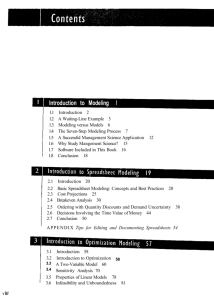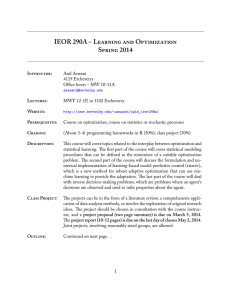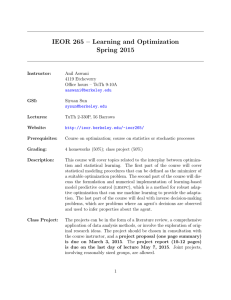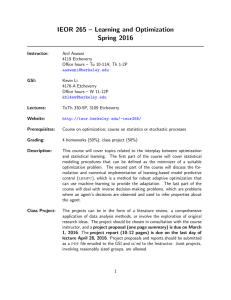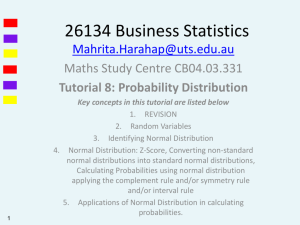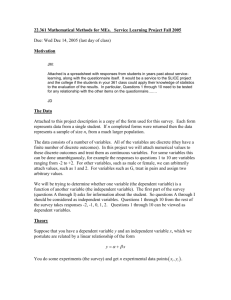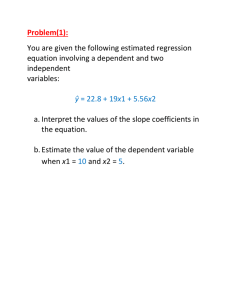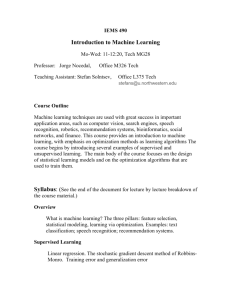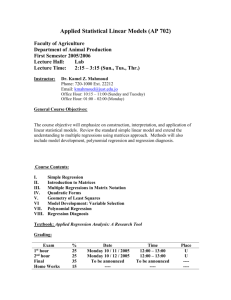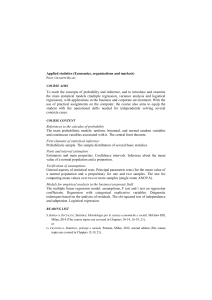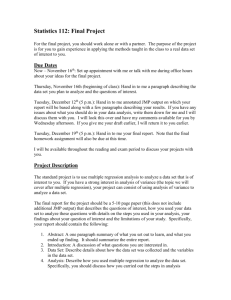Syllabus of Data Model and Decisions
advertisement
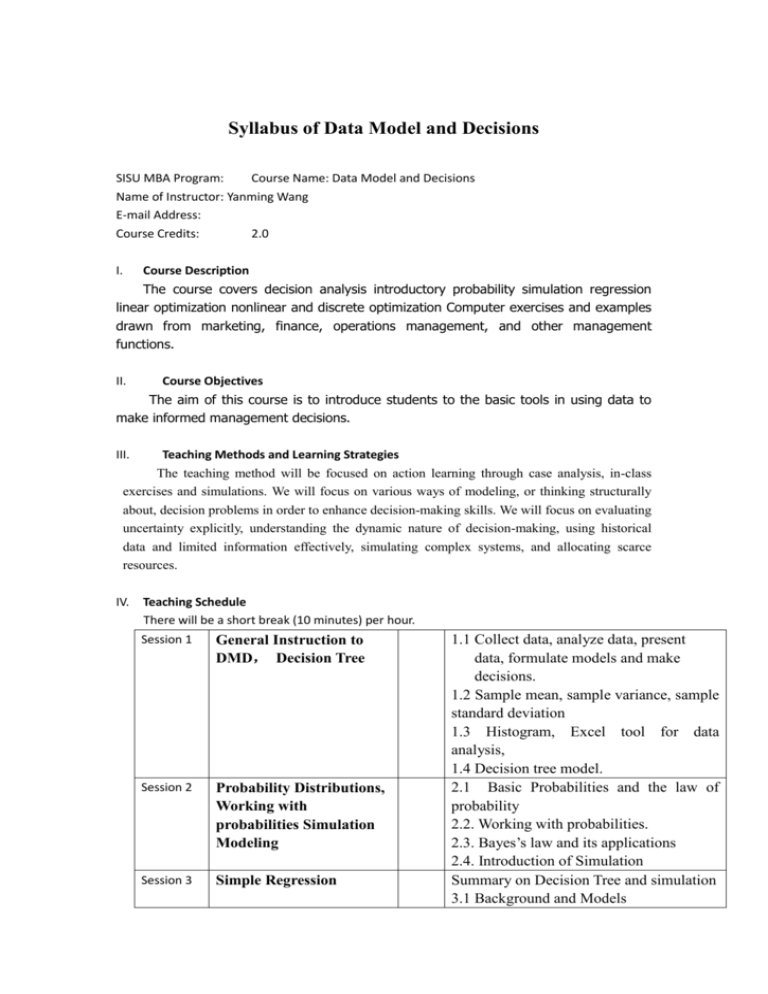
Syllabus of Data Model and Decisions SISU MBA Program: Course Name: Data Model and Decisions Name of Instructor: Yanming Wang E-mail Address: Course Credits: 2.0 I. Course Description The course covers decision analysis introductory probability simulation regression linear optimization nonlinear and discrete optimization Computer exercises and examples drawn from marketing, finance, operations management, and other management functions. II. Course Objectives The aim of this course is to introduce students to the basic tools in using data to make informed management decisions. III. Teaching Methods and Learning Strategies The teaching method will be focused on action learning through case analysis, in-class exercises and simulations. We will focus on various ways of modeling, or thinking structurally about, decision problems in order to enhance decision-making skills. We will focus on evaluating uncertainty explicitly, understanding the dynamic nature of decision-making, using historical data and limited information effectively, simulating complex systems, and allocating scarce resources. IV. Teaching Schedule There will be a short break (10 minutes) per hour. Session 1 General Instruction to DMD, Decision Tree Session 2 Probability Distributions, Working with probabilities Simulation Modeling Session 3 Simple Regression 1.1 Collect data, analyze data, present data, formulate models and make decisions. 1.2 Sample mean, sample variance, sample standard deviation 1.3 Histogram, Excel tool for data analysis, 1.4 Decision tree model. 2.1 Basic Probabilities and the law of probability 2.2. Working with probabilities. 2.3. Bayes’s law and its applications 2.4. Introduction of Simulation Summary on Decision Tree and simulation 3.1 Background and Models V. Session 4 Multiple Regression Session 5 Linear Optimization Session 6 Discrete and Mixed Optimization Session 7 Variable distribution and central limit theorem Session 8 Statistical Sampling and applications 3.2 Simple Regression skill. 4.1 Explanation of the regression model 4.2 Regression modeling techniques 5.1 Formulation of practical problems 5.2 Feasible solution and optimal solution 5.3 Sensitive analysis and shadow prices on constraints 5.4 Economic analysis 6.1 Integer optimization. 6.2 Logical condition and mixed-integer mode 6.3 Software of solving discrete optimization problem 6.4 A strategic relocation problem 7.1 Binomial distribution 7.2 Normal distribution 7.3 Central limit theorem 8.1 Confidence interval 8.2 Sample size 8.3 Review of the course Assessment Methods The following evidence will be used to determine your grade: 1. 2. 3. 4. Case Presentation 30%. Case Write-ups and Homework: 30%. Final examination: 30% Class Participation: 10%. 1. Final Exam The exam is closed-book and the expected duration is 2 hours. Students are allowed to bring a single sheet of paper with all the notes, formulas, definition they wish. They should also bring a calculator. We will divide students in a few groups. For part-time class, we have 6 groups. Homework: 1 Homework: 1. Group homework: Case preparation Group 1. The Kendall Crab and Lobster case (p35 Case 1) Group 2 The acquisition of DSOFT (p38 Case ) Group 3 San Carlos Mud Slides (p98 Case ) Group 4 Graphic Corporation (p99 Case ) (each group has 15 minutes to present at beginging of the 3rd class) 2. Individual homework Homework P44 Ex 1.1, P46 Ex.1.2 Homework 2: 1. Group homework: Case preparation Group 5 The Lawsuit case. Group 6 Heating oil company case. Group 7. Robinson Appraisal Case (Teaching Package) Group 8 "The Construction Department at Croq' Pain" (P299) 2. Individual homework P313 Ex. 6.1, P315 Ex. 6.3, Homework 3: 1. Group homework: Case preparation Group 1,2 Group 3.4 Group 5,6 Group 7,8 Sytech International (P380) Filatoi Riuniti (P389) “International Industries Case” (page 471) “Short Run Manufacturing Problems at DEC.” (Page 375) 2. Individual homework P398 Ex. 7.2, P400 Ex. 7.6, P404 Ex 7.10 VII. Textbooks and References Data, Models, and Decisions: The fundamentals of Management Science” by Dimitris Bertsimas and Robert Freund, Southwestern College Publishing, 2004.e Teaching Notes: Read carefully to understand the teaching notes and case materials with data file.
